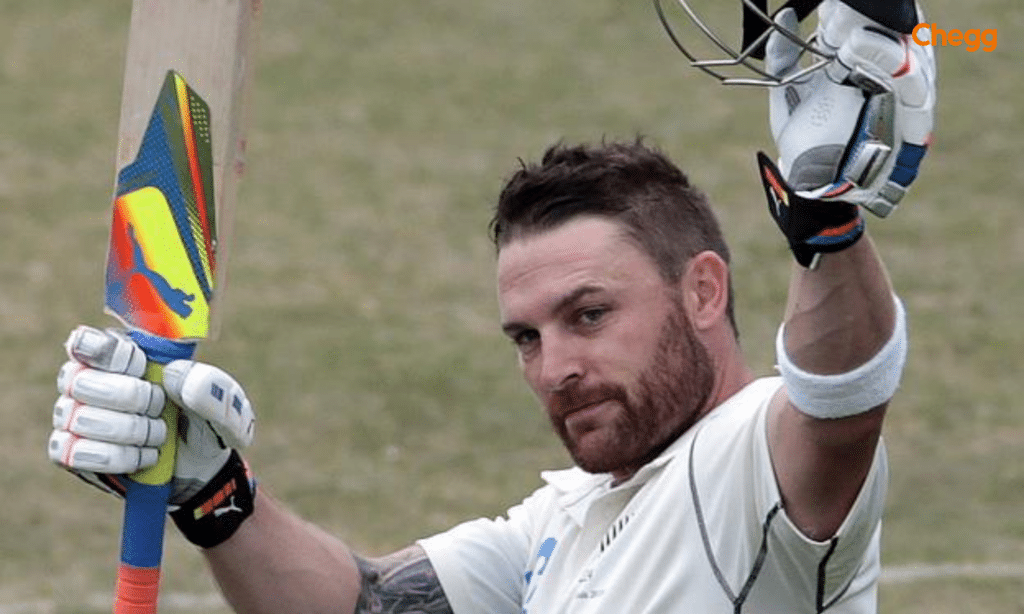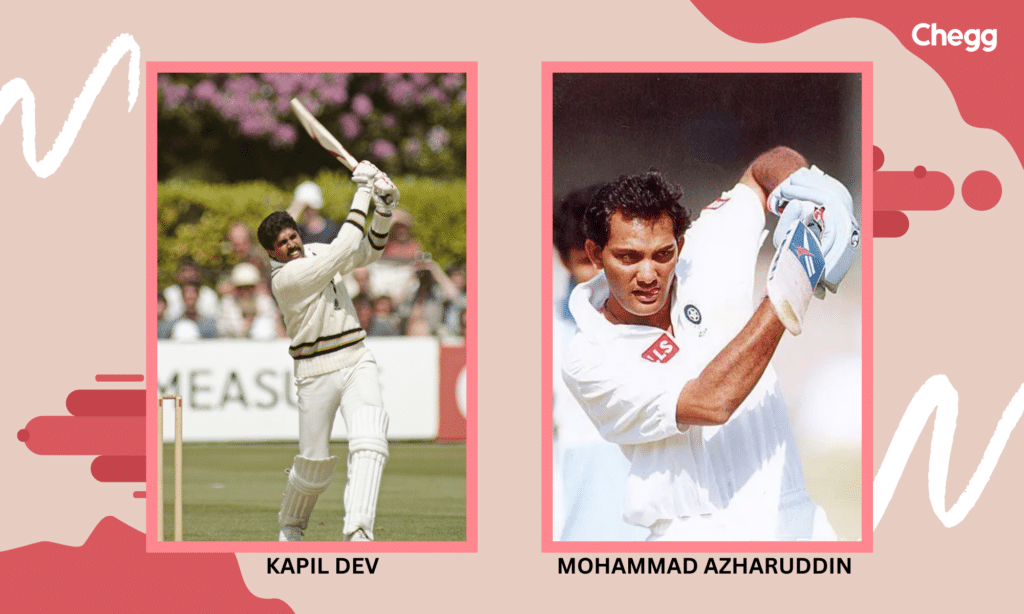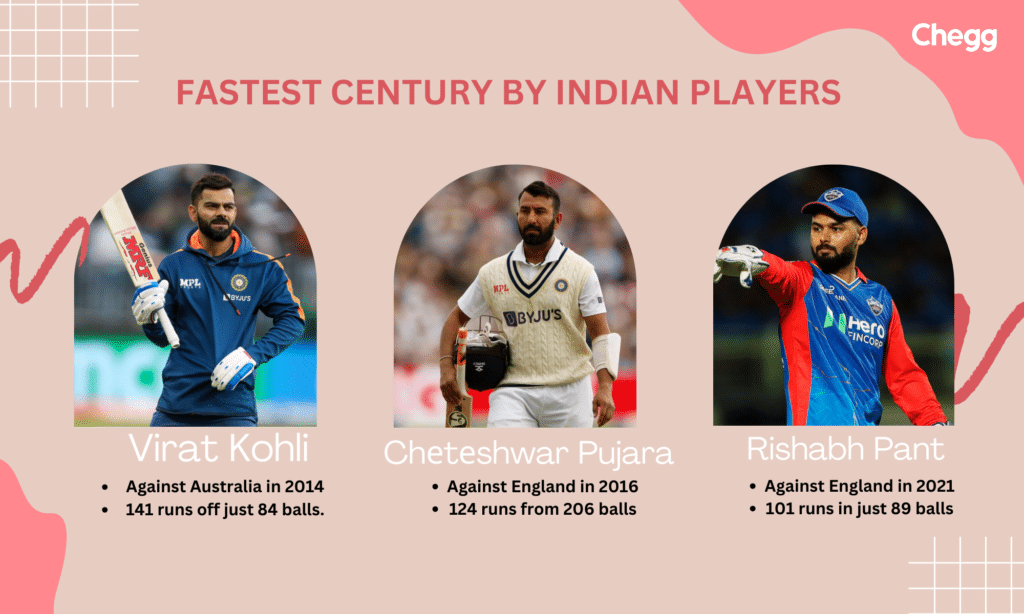
Quick Summary
Table of Contents
Test cricket is the sport’s most extended and traditional format, symbolizing endurance, skill, and patience. It is played between two teams, each consisting of eleven players, over a maximum of five days. This format is the ultimate test of a cricketer’s mental and physical ability.
Brendon McCullum holds the record for the fastest century in Test cricket, scoring 100 runs in just 54 balls. He set this record during his final Test match against Australia in 2016. This broke the previous record of 56 balls, which Viv Richards and Misbah-ul-Haq shared.
A significant milestone in Test cricket is a “century,” which refers to a batsman scoring 100 or more runs in a single innings. Achieving a century is a notable accomplishment in any format, but in Test cricket, it is especially revered because of the patience, technique, and stamina required. The “fastest test century” is a remarkable feat among the many centuries recorded, reflecting a player’s ability to score quickly under immense pressure.
Every cricketer aspires to excel in Test cricket, with batsmen aiming to score as many runs as possible to secure victory for their team. Some players, however, go beyond just winning; they seek to break records and leave a lasting mark on the game. Among the most prestigious achievements is scoring the fastest Test century, which showcases a unique combination of skill, aggression, and precision. The fastest century in Test cricket is a record that many cricketers dream of breaking, with only a few having the opportunity to achieve it.
It is a moment celebrated by players and fans alike, marking the player’s name in the history of cricket for achieving the fastest Test century. This record demonstrates technical skill and a fearless approach to the game as players take on the challenge of scoring the fastest 100 in Test cricket against some of the best bowlers in the world. These moments often become defining achievements in players’ careers and are regularly featured in the fastest century list across cricket archives.
Here’s a look at some players who have set the record for the fastest hundreds in Test cricket, demonstrated extraordinary prowess, and rewritten history books with incredible performances.
Read More: The Highest Wicket Taker in Test Cricket: Records and Legends
Thе rеcord for thе fastest Test century in cricket bеlongs to Brеndon McCullum, thе formеr captain of Nеw Zеaland. He scorеd 100 runs off just 54 balls against Australia at Christchurch in 2016. It was Brendon McCullum’s last Test match, and he made it a historic one by breaking Viv Richards and Misbah-ul-Haq’s rеcord of 56 balls. McCullum’s cеntury was also thе fastеst in all forms of intеrnational crickеt at the time, including being the fastest 100 in Test cricket history.

Brendon McCullum is renowned for his aggressive and explosive batting style, making him one of the world’s most entertaining and dangerous batsmen. His versatility allowed him to excel in any batting position, and his leadership on the field was marked by courage and charisma, inspiring his team to perform at their best. His record-breaking fastest Test century was a fitting farewell to his illustrious career, showcasing his passion and talent for the game.
In Test cricket, a century is more than a personal achievement; it significantly contributes to the team’s score. A fast century can change the momentum of a match or even a series, giving the team a decisive edge over the opposition. It also boosts the confidence and morale of the batsman and his teammates, earning them respect and admiration from fans and critics alike.
Players who feature on the fastest century list not only entertain but redefine the pace and dynamics of Test matches. The fastest hundred in Test conditions often comes against top-tier opponents, adding value to the feat.
Read More: Fastest 1000 runs in ODI: Achievements and Records
In the 1980s, cricket legend Viv Richards broke Jack Gregory’s long-standing record by scoring a century off just 56 balls in a Test match against England in 1986 at St. John’s, Antigua. This remarkable feat stood as the fastest Test century for 30 years. During this period, only twice did other players come close to challenging Richards’ record, highlighting the extraordinary nature of his achievement and his place in the fastest century list.
In November 2014, former Pakistani captain Misbah-ul-Haq, renowned for his composed and steady batting in Test cricket, surprised everyone by altering his playing style during a match’s second innings. He went on to score the fastest Test century at the time. His aggressive approach, which led to scoring the fastest hundred in Test cricket in just 56 balls, showcased his versatility and ability to adapt.
Misbah’s remarkable feat earned him a place among those with the fastest centuries in Test history and made him part of an elite group of players who had achieved this rare accomplishment. His record-breaking innings demonstrated how the fastest test century could be scored with a blend of audacity and skill. His effort equaled Viv Richards’ long-standing record and proved that fast scoring is possible even in the most traditional format of the game.
Hеrе is a list of thе top scorеs of thе fastest century in test cricket, along with thеir scorеs, balls facеd, match vеnuе, opponеnt tеam, and yеar.
| Balls | Player | Match | Location | Season |
|---|---|---|---|---|
| 54 | BB McCullum | New Zealand v Australia | Christchurch | 2015/16 |
| 56 | IVA Richards | West Indies v England | St John’s | 1985/86 |
| 56 | Misbah-ul-Haq | Pakistan v Australia | Abu Dhabi | 2014/15 |
| 57 | AC Gilchrist | Australia v England | Perth | 2006/07 |
| 67 | JM Gregory | Australia v South Africa | Johannesburg | 1921/22 |
| 69 | S Chanderpaul | West Indies v Australia | Georgetown | 2002/03 |
| 69 | DA Warner | Australia v India | Perth | 2011/12 |
| 70 | CH Gayle | West Indies v Australia | Perth | 2009/10 |
| 71 | RC Fredericks | West Indies v Australia | Perth | 1975/76 |
| 71 | C de Grandhomme | New Zealand v West Indies | Wellington | 2017/18 |
| 74 | Majid Khan | Pakistan v New Zealand | Karachi | 1976/77 |
| 74 | M Azharuddin | India v South Africa | Calcutta | 1996/97 |
| 74 | BB McCullum | New Zealand v Sri Lanka | Hagley Oval, Christchurch | 2014/15 |
| 75 | AB de Villiers | South Africa v India | Centurion | 2010/11 |
| 76 | GL Jessop | England v Australia | The Oval | 1902 |
| 77 | BC Lara | West Indies v Pakistan | Multan Cricket Stadium | 2006/07 |
| 77 | JM Bairstow | England v New Zealand | Nottingham | 2022 |
| 78 | Shahid Afridi | Pakistan v West Indies | Kensington Oval, Bridgetown | 2004/05 |
| 78 | Shahid Afridi | Pakistan v India | Gaddafi Stadium, Lahore | 2005/06 |
| 78 | V Sehwag | India v West Indies | Beausejour Stadium, Gros Islet | 2006 |
| 78 | BB McCullum | New Zealand v Pakistan | Sharjah Cricket Stadium | 2014/15 |
| 78 | DA Warner | Australia v Pakistan | Sydney Cricket Ground | 2016/17 |
| 79 | CH Gayle | West Indies v South Africa | Newlands, Cape Town | 2003/04 |
| 80 | CH Gayle | West Indies v England | Kennington Oval | 2004 |
| 80 | Sarfraz Ahmed | Pakistan v Australia | Dubai Sports City Stadium | 2014/15 |
| 80 | Harry Brook | England v Pakistan | Rawalpindi | 2022/23 |
| 80 | Jamie Smith | England v India | Kennington Oval | 2025 |
| 81 | DPMD Jayawardene | Sri Lanka v Bangladesh | Sinhalese Sports Club Ground | 2001/02 |
| 81 | Kamran Akmal | Pakistan v India | Gaddafi Stadium, Lahore | 2005/06 |
| 81 | LRPL Taylor | New Zealand v Australia | Seddon Park, Hamilton | 2009/10 |
| 82 | BC Lara | West Indies v Australia | Antigua Recreation Ground, St John’s | 1998/99 |
| 82 | DL Vettori | New Zealand v Zimbabwe | Harare Sports Club | 2005/06 |
| 82 | DA Warner | Australia v West Indies | Sydney | 2015/16 |
| 83 | BR Taylor | New Zealand v West Indies | Eden Park, Auckland | 1968/69 |
| 84 | AC Gilchrist | Australia v India | Wankhede Stadium, Mumbai | 2000/01 |
| 84 | AC Gilchrist | Australia v Zimbabwe | Perth | 2003/04 |
| 84 | ML Hayden | Australia v Zimbabwe | Sydney Cricket Ground | 2003/04 |
| 85 | CH Lloyd | West Indies v India | M Chinnaswamy Stadium, Bangalore | 1974/75 |
| 85 | J Darling | Australia v England | Sydney | 1898 |
| Balls | Player | Match | Location | Season |
|---|---|---|---|---|
| 85 | S Dhawan | India v Australia | Punjab Cricket Association Stadium, Mohali | 2012/13 |
| 85 | BA Stokes | England v New Zealand | Lord’s | 2015 |
| 86 | IT Botham | England v Australia | Headingley, Leeds | 1981 |
| 86 | IT Botham | England v Australia | Old Trafford, Manchester | 1981 |
| 86 | Kapil Dev | India v England | Modi Stadium, Kanpur | 1981/82 |
| 86 | CL Cairns | New Zealand v Zimbabwe | Eden Park, Auckland | 1995/96 |
| 86 | Wasim Akram | Pakistan v Sri Lanka | Galle International Stadium | 2000 |
| 86 | AC Gilchrist | Australia v New Zealand | Basin Reserve, Wellington | 2004/05 |
| 86 | MG Johnson | Australia v South Africa | Newlands, Cape Town | 2008/09 |
| 86 | HH Pandya | India v Sri Lanka | Pallekele | 2017 |
| 86 | Zak Crawley | England v Pakistan | Rawalpindi | 2022/23 |
| 87 | V Sehwag | India v Sri Lanka | Galle International Stadium | 2008 |
| 87 | V Sehwag | India v South Africa | Eden Gardens, Kolkata | 2009/10 |
| 87 | HM Amla | South Africa v Australia | Perth | 2012/13 |
| 87 | S Dhawan | India v Afghanistan | Bengaluru | 2018 |
| 88 | RJ Hadlee | New Zealand v West Indies | Lancaster Park, Christchurch | 1979/80 |
| 88 | M Azharuddin | India v England | Lord’s | 1990 |
| 88 | BC Lara | West Indies v Pakistan | Kensington Oval, Bridgetown | 2005 |
| 88 | KP Pietersen | England v West Indies | Queen’s Park Oval, Port of Spain | 2008/09 |
| 88 | Ben Duckett | England v India | Rajkot | 2023/24 |
| 89 | RR Lindwall | Australia v England | Melbourne Cricket Ground | 1946/47 |
| 89 | RR Pant | India v England | Birmingham | 2022 |
| 90 | ST Jayasuriya | Sri Lanka v Zimbabwe | Harare Sports Club | 2004 |
| 90 | V Sehwag | India v Sri Lanka | P Sara Oval, Colombo | 2010 |
| 90 | V Sehwag | India v England | Sardar Patel Stadium, Motera, Ahmedabad | 2012/13 |
| 90 | Ollie Pope | England v Pakistan | Rawalpindi | 2022/23 |
| 91 | AC Gilchrist | Australia v South Africa | Newlands, Cape Town | 2001/02 |
| 91 | Harry Brook | England v New Zealand | Wellington | 2024/25 |
| 91 | Harry Brook | England v India | Kennington Oval | 2025 |
| 92 | Abdul Razzaq | Pakistan v Bangladesh | Multan Cricket Stadium | 2001/02 |
| 93 | DR Smith | West Indies v South Africa | Newlands, Cape Town | 2003/04 |
| 93 | V Sehwag | India v Pakistan | Gaddafi Stadium, Lahore | 2005/06 |
| 93 | MS Dhoni | India v Pakistan | Iqbal Stadium, Faisalabad | 2005/06 |
| 93 | TM Dilshan | Sri Lanka v Bangladesh | Chittagong | 2008/09 |
| 93 | DA Warner | Australia v South Africa | Adelaide Oval | 2012/13 |
| 94 | Zaheer Abbas | Pakistan v India | Iqbal Stadium, Faisalabad | 1982/83 |
| 94 | SM Gavaskar | India v West Indies | Feroz Shah Kotla, Delhi | 1983/84 |
| 94 | AC Gilchrist | Australia v England | Sydney Cricket Ground | 2002/03 |
| 94 | BB McCullum | New Zealand v Zimbabwe | Harare Sports Club | 2005/06 |
| 94 | Tamim Iqbal | Bangladesh v England | Lord’s | 2010 |
| 94 | Soumya Sarkar | Bangladesh v New Zealand | Hamilton | 2018/19 |
| Balls | Player | Match | Location | Season |
|---|---|---|---|---|
| 95 | DT Lindsay | South Africa v Australia | New Wanderers Stadium, Johannesburg | 1966/67 |
| 95 | Kapil Dev | India v West Indies | Queen’s Park Oval, Port of Spain | 1982/83 |
| 95 | JN Rhodes | South Africa v West Indies | Centurion Park, Centurion | 1998/99 |
| 95 | SM Pollock | South Africa v Sri Lanka | Centurion Park, Centurion | 2000/01 |
| 95 | Graham Gooch | England v India | Lord’s, London | 1990 |
| 96 | CH Gayle | West Indies v South Africa | Antigua Recreation Ground, St John’s | 2004/05 |
| 96 | Shahid Afridi | Pakistan v India | Iqbal Stadium, Faisalabad | 2005/06 |
| 96 | Tom Blundell | New Zealand v England | Basin Reserve, Wellington | 2024/25 |
| 97 | K Srikkanth | India v Australia | Sydney Cricket Ground | 1985/86 |
| 97 | JE Taylor | West Indies v New Zealand | University Oval, Dunedin | 2008/09 |
| 97 | V Sehwag | India v Sri Lanka | Modi Stadium, Kanpur | 2009/10 |
| 97 | Brian Bennett | Zimbabwe v England | Trent Bridge, Nottingham | 2025 |
| 98 | RS Kaluwitharana | Sri Lanka v New Zealand | Carisbrook, Dunedin | 1996/97 |
| 98 | Mominul Haque | Bangladesh v New Zealand | Chittagong | 2013/14 |
| 99 | IT Botham | England v New Zealand | Trent Bridge, Nottingham | 1983 |
| 99 | LRPL Taylor | New Zealand v India | M Chinnaswamy Stadium, Bangalore | 2012 |
| 99 | KDK Vithanage | Sri Lanka v Bangladesh | Shere Bangla National Stadium, Mirpur | 2013/14 |
| 100 | Tamim Iqbal | Bangladesh v England | Old Trafford, Manchester | 2010 |
| 100 | Ben Duckett | England v Zimbabwe | Trent Bridge, Nottingham | 2025 |
Mohammad Azharuddin and Kapil Dev jointly hold the record for the fastest Test century for India, each scoring 100 runs in just 74 balls. This blazing effort earned them a spot on the fastest century list, showcasing rare brilliance and attacking flair in red-ball cricket.
Their achievement resembles a sprinter racing to the finish line, pure speed and precision. In the realm of the fastest hundred in Test cricket, scoring a century in such a short span elevates a batsman’s legacy. It’s not only about runs, it’s about doing it at pace, breaking traditions, and earning recognition among the fastest centuries in Test records.
Virender Sehwag revolutionized the role of a Test opener with his fearless, attacking style, contrasting sharply with the traditional defensive mindset. Relying on hand-eye coordination over classic technique, he scored rapidly, often unsettling bowlers from the outset. His aggressive approach led to two triple centuries and near entries on the fastest century list.
In contrast, Rahul Dravid, “The Wall,” epitomized patience and technical mastery, anchoring innings with composure. Their contrasting styles, Sehwag’s explosiveness and Dravid’s resilience, offered India a perfect balance. While Dravid accumulated runs methodically, Sehwag redefined what an opener could achieve in Tests. His legacy endures as a disruptor who proved that bold strokeplay and historic milestones, like the fastest Test century, could go hand in hand.

Virat Kohli has achieved something extraordinary in Test cricket by scoring 30 centuries, each a significant milestone. One of his most remarkable performances was against Australia in 2014 at Adelaide.
In that match, Kohli reached a century swiftly, amassing 100 runs in 184 balls. While it wasn’t the fastest test century, it was among the fastest by an Indian captain, reinforcing his ability to play aggressively. This rapid scoring is akin to hitting the ball far and running between the wickets at a blistering pace. His achievement deserves mention among the fastest centuries in test matches led by Indian players.
What makes this feat even more impressive is that it was Kohli’s debut match as the captain of the Indian team, stepping in for MS Dhoni, who was injured. In his first match as captain, Kohli scored this century, scoring the fastest hundred in test by an Indian captain. This achievement showcased his exceptional talent and made the nation proud of its new leader, Virat Kohli. He continues to be a contender in the evolving fastest century list.
Cheteshwar Pujara is a dependable batsman for India’s cricket team. He typically bats at the crucial number three position. He has established himself as a solid performer in Test matches, having scored 19 centuries. One of his standout performances came in a game against England in 2016, played in Rajkot.
Pujara scored an impressive 124 runs from 206 balls in that match, marking one of his fastest centuries in Test cricket. Though not the fastest 100 in test, his knock was a reminder that even steady players can accelerate when required. This was his ninth century in Test matches and his third against England, solidifying his reputation as a reliable and skilled batsman.
India was in a challenging position then, trailing by 49 runs after the first innings. Pujara’s century was pivotal in turning the game around and helping India level the score. His remarkable effort ensured that the match ended in a draw, which was a commendable result given the circumstances. Pujara’s resilience and determination were key to India’s performance in that game, and he showed he could match the tempo with players in the fastest test century pursuit.
Rishabh Pant is a dynamic and exciting young talent in the Indian cricket team. He is known for his impressive wicketkeeping and powerful batting. In the highly challenging format of Test cricket, Pant has already scored eight centuries. One of his most remarkable achievements came in 2021, when he scored a blistering century against England, reaching 101 runs in just 89 balls.
This was one of his fastest centuries, and a significant milestone as he achieved it on home soil in India. His quick century was notable, as it matched the pace of another fastest test century for India by a wicketkeeper. Moreover, it became the fastest century ever scored by a wicketkeeper in test cricket, showcasing Pant’s exceptional talent and flair. His performances inspire a new generation of players aiming to break into the fastest century list and emulate the flair seen in Brendon McCullum’s last test match heroics.

Test cricket is traditionally known for its slow and methodical approach, but some players have broken the mold with rapid centuries. Here’s a look at some of the fastest test centuries based on the minutes taken to reach the milestone:
These instances highlight how particular batsmen have defied traditional expectations of Test cricket’s slow pace, achieving remarkable feats of scoring speed worthy of the fastest 100 in test records.
Scoring a double century in Test cricket is a significant achievement, showcasing a player’s exceptional skill, concentration, and stamina. Unlike limited-overs formats, Test cricket can last up to five days, making reaching 200 runs in a single innings particularly impressive.
Achieving the fastest double century adds another layer of prestige. It demonstrates the ability to maintain focus while accelerating the score, much like efforts made in the fastest test century domain.
These players not only reached 200 runs but did so in the shortest amount of time, which is incredibly impressive. They faced the cricket balls and bowlers with determination and power.
Here are their names, the scores they achieved, the number of balls they faced, where the match was played, the opposing team, and the year it happened:

Scoring a triple century in Test cricket is rare and remarkable. Players who do so must possess technical expertise and the physical and mental resilience to endure and dominate. When achieved at pace, these milestones often rival those in the fastest test century and fastest century in test debates.
The Test cricket world has been shaped by legends who compiled runs and redefined the pace of play. From Brendon McCullum’s last test match heroics to Sehwag’s dazzling centuries and Pant’s modern-day brilliance, the fastest test century remains one of the most coveted and celebrated achievements.
Whether you’re analyzing the fastest 100 in test records, admiring the technique of players with the most test runs in international cricket, or simply scanning the fastest century list, one thing is clear: speed, flair, and precision now play as much a role in Tests as endurance and defense.
Read More:
Mudassar Nazar from Pakistan holds the record for the slowest century in Test cricket history. He reached his century in 557 minutes (over 9 hours) against England in Lahore in 1977.
Donald Bradman (Australia), Brian Lara (West Indies), Virender Sehwag (India), and Chris Gayle (West Indies) are the only batsmen to score 300 or more runs on multiple occasions.
AB de Villiers from South Africa holds the record for the fastest century in One Day International (ODI) cricket history. He accomplished this feat in just 31 balls against West Indies in Johannesburg in 2015.
In August 2017, Hardik Pandya destroyed Sri Lanka at Pallekele Cricket Stadium with an 86-ball century.
The record for the fastest Test century is held by New Zealand’s Brendon McCullum, who scored 100 runs off 54 balls in his final Test match. With the increase in Test matches today, modern players dominate the aggregate lists.
Gilbert Jessop became the fastest English Test century scorer. In just 76 balls, he reached this milestone in the 1902 at the Oval against Australia.
The fastest century in T20 cricket was scored by Chris Gayle, who reached 100 runs off just 30 balls against India in the 2016 T20 World Cup.

Authored by, Muskan Gupta
Content Curator
Muskan believes learning should feel like an adventure, not a chore. With years of experience in content creation and strategy, she specializes in educational topics, online earning opportunities, and general knowledge. She enjoys sharing her insights through blogs and articles that inform and inspire her readers. When she’s not writing, you’ll likely find her hopping between bookstores and bakeries, always in search of her next favorite read or treat.
Editor's Recommendations
Chegg India does not ask for money to offer any opportunity with the company. We request you to be vigilant before sharing your personal and financial information with any third party. Beware of fraudulent activities claiming affiliation with our company and promising monetary rewards or benefits. Chegg India shall not be responsible for any losses resulting from such activities.
Chegg India does not ask for money to offer any opportunity with the company. We request you to be vigilant before sharing your personal and financial information with any third party. Beware of fraudulent activities claiming affiliation with our company and promising monetary rewards or benefits. Chegg India shall not be responsible for any losses resulting from such activities.